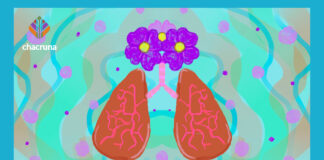This is How Ayahuasca is Brewed at a Santo Daime Church...
At a Chacruna retreat in Brazil, Marcelo Leite and other team members took part in a feitio ayahuasca ritual at a Santo Daime church. Leite describes the steps of the ceremony and his experience.
Guarani Shamanism in the University
What happens when traditional knowledge is incorporated into the classroom? At the Federal University of Minas Gerais in Brazil, two Guarani shamans were given the opportunity to be lecturers as part of the Transversal Training Program in Traditional Knowledge.
The Resurrection of Jurema (3)
Brazilian religions with Indigenous and African roots such as Catimbó and Jurema Sagrada, centered around the sacred plant jurema-preta (Mimosa tenuiflora), have survived in the Northeastern region, in spite of repression by Catholic institutions and the police. In recent decades, they also became a point of interest for neoshamans in urban contexts.
The Resurrection of Jurema (2)
Neuroscientist Dráulio de Araújo leads clinical trials to gauge the antidepressant potential of DMT, but is also keen on deciphering why this psychedelic compound abounds in the jurema tree and all over the natural world.
The Resurrection of Jurema (1)
Reporter recounts his experience as a volunteer in a Brazilian study that investigates the antidepressant potential of a psychedelic substance extracted from a tree native to the semi-arid Caatinga Region.
Anonymous Letter to Conservative Masters of the UDV
This is an anonymous letter by members of the Union of the Vegetal (UDV) showing their dissatisfaction with the explicit support of certain masters at the top of the hierarchy of the UDV for the Bolsonaro government's denialist and anti-democratic policy, claiming that these practices are completely out of line with the teachings of Mestre Gabriel. Conservative demonstrations by the group's leaders are nothing new, but they began to gain public notoriety with the increase in political polarization in Brazil.
The Misfortune of Right Wing Psychedelia in Brazil
In an anonymous letter, members of the Union of the Vegetal (UDV) have shown their dissatisfaction with the explicit support of certain masters at the top of the hierarchy of the UDV for the Bolsonaro government's denialist and anti-democratic policy, claiming that these practices are completely out of line with the teachings of Mestre Gabriel. Conservative demonstrations by the group's leaders are nothing new, but they began to gain public notoriety with the increase in political polarization in Brazil.
Tea and Ashes: How Ayahuasca Can Help You Quit Smoking
The mystical experience is likely one of the therapeutic mechanisms for psychedelics, including ayahuasca, to have therapeutic potential for drug addiction. This article explores the findings of a study in which there was a connection between ayahuasca use and smoking cessation.
The Emergent Field of Psychedelic Chaplaincy
Jasmine Virdi and Oriana Mayorga explore the emergent field of psychedelic chaplaincy, exploring the ways in which spiritual and religious experiences are understood within the contemporary psychedelic landscape.
A Medicine Heritage of 160 Indigenous Peoples: The Origins of Ayahuasca...
This brief and powerful history of Indigenous practices with ayahuasca before its globalization emphasizes the loss that has (and continues) to occur within these Indigenous communities. It also remarks on the importance of honoring and including Indigenous voices in the conversations being had as ayahuasca and other plant medicines gain popularity within the Western scientific sphere.














